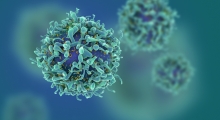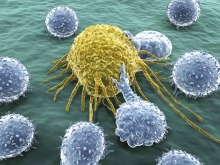Scientists have been worried about the potential harms of microplastics for years. These small plastic particles less than 5 mm in length have been found everywhere because of plastic pollution – from the Earth’s deep oceans to remote regions in Antarctica, and even the seafood we eat. But, are microplastics really harmful?


First study of humans with a rare immunodeficiency reveals how the immune system protects the body against pathogens known to cause serious diseases, such as tuberculosis and COVID-19. The research involving McGill University, paves the way for new therapies to treat autoimmune diseases, chronic inflammatory diseases, and new approaches to vaccine development.
The findings, published in the journal Trends in Cognitive Sciences earlier in June, show how social isolation can negatively affect the health of the brain as well as the immune system.“Social isolation, or a lack of social opportunity, gives rise to a sense of loneliness. Directly or indirectly, this feeling has many wide-ranging consequences for our psychological well-being as well as our physical health, even our longevity,” the study states.

The immune system can be an important ally in the fight against cancer. A study from McGill scientists published today in Science suggests that the reverse may also be true – that abnormal inflammation triggered by the immune system may underlie the development of stomach tumours in patients with a hereditary cancer syndrome known as Peutz-Jeghers Syndrome (PJS). The findings are likely to prompt a re-thinking of how gastric tumours form in patients with this syndrome and in others with gastrointestinal cancers.

How do viruses that cause chronic infections, such as HIV or hepatitis C virus, manage to outsmart their hosts’ immune systems?
The answer to that question has long eluded scientists, but new research from McGill University has uncovered a molecular mechanism that may be a key piece of the puzzle. The discovery could provide new targets for treating a wide range of diseases.

Study reveals the impact of night work
You cross paths with him at the break of dawn in the corridors of the Metro. He looks bleary-eyed and pallid. This worker’s night shift just ended. His body clocks are out of sync with one another, and, imperceptibly, they’re also out of sync with his environment. In the long run, this night owl could be at greater risk of developing cardiovascular, autoimmune diseases or certain types of cancer.

By Cynthia Lee
Newsroom
Chronic pain may reprogram the way genes work in the immune system, according to a new study by McGill University researchers published in the journal Scientific Reports.
By Chris Chipello


There are believed to be around 1.5 million different species of fungus on Earth, but one mold, known as Aspergillus fumigatus, causes the majority of cases of invasive aspergillosis – a devastating illness that kills 90 per cent of patients with weakened immune systems or lung diseases.


A Canadian research team at the IRCM in Montréal, led by molecular virologist Éric A. Cohen, PhD, made a significant discovery on how HIV escapes the body’s antiviral responses. The team uncovered how an HIV viral protein known as Vpu tricks the immune system by using its own regulatory process to evade the host’s first line of defence. This breakthrough was published yesterday in the scientific journal PLoS Pathogens and will be presented at the upcoming IAS 2015 conference in Vancouver. The findings pave the way for future HIV prevention or cure strategies.

With the arrival of spring, millions of Canadians have begun their annual ritual of sneezing and wheezing due to seasonal allergies. A research team at the Montreal Children’s Hospital from the Research Institute of the McGill University Health Centre (RI-MUHC) is bringing them hope with a potential vaccine that nudges the immune response away from developing allergies.
